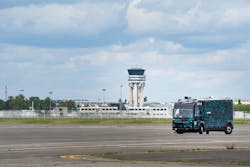Airbus Optimate demonstrator hits the tarmac to test new pilot assistance technologies
PARIS - Airbus UpNext, a subsidiary of Airbus in Toulouse, France, has initiated testing of new technologies aimed at supporting automatic taxiing and enhancing pilot assistance using an innovative electric truck.
The three-year research project, named Optimate, will integrate advanced automation, computer vision, data fusion, and machine learning to improve aircraft navigation systems, the human-machine interface, and overall flight safety.
“We are delighted to unveil another innovative demonstrator that reflects our unwavering commitment to pushing the boundaries of aviation. Our ambition is to use the best technologies to make our aircraft even more aware of their operating conditions, analyzing it in as much detail as possible to become smart and reliable assistants to pilots, providing them with the optimal assistance. We are confident that this project will contribute to safer and more efficient air travel,” said Michael Augello, CEO of Airbus UpNext.
Related: Airbus-led European liquid hydrogen project underway for aviation and ground operations
A primary objective for Optimate is to develop and test automatic taxiing based on more accurate and reliable position calculation and to assess the potential of quantum sensing to enhance position availability and navigation system robustness. Additionally, the project aims to explore the capabilities of a collaborative map and virtual flight assistant to support pilots' strategic decisions and interactions with air traffic control and airline operations centers.
To reduce CO₂ emissions from test operations, the new architecture and algorithms will be validated on a testbed electric truck that replicates the key functions of a real aircraft cockpit and can move along airport runways. This testbed will recreate an A350 cockpit on wheels, featuring advanced automation technologies such as the latest generation of LIDAR and external cameras, combined with inertial and GPS technologies, satcom, and 5G.
The final phase of the project will involve using the virtual assistant during a fully automated gate-to-gate mission on an A350 flight test aircraft.
